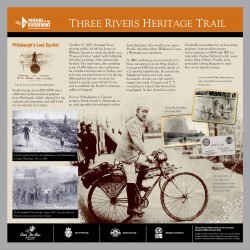Last Friday evening, I went searching for Frank Lenz, one of Pittsburgh’s most notable cyclists. To be fair, Lenz went missing almost 120 years ago, in Erzurum, Turkey, so I really didn’t have much hope of finding anything, but I figured I’d give it a shot.
I headed over to the Brew House Art Gallery on the South Side, where David Herlihy, the author of The Lost Cyclist: The Epic Tale of an American Adventurer and His Mysterious Disappearance, was slated to give a talk about Lenz’s journey by bicycle around the world, his disappearance, and the adventures of William Sachtleben, another cyclist who had ridden around the world, and who was sent to find Lenz. Prior to Herlihy’s talk, I had not heard of Lenz or Sachtleben, but a worldwide cycling tour intrigued me, and plus, who doesn’t liked those old-timey, big-wheeled bikes?

Lenz and his companions, rocking the big-wheelers
Lenz was apparently a big fan. Born in Philadelphia, he moved to Pittsburgh and became an accountant by day, and a weekend warrior who captained the Allegheny Cycle Club. He organized and competed in his fair share of big-wheeled bike races, and pioneered the burgeoning field of cycle photography—an impressive feat, considering that cameras were just as cumbersome as bicycles at the time. Lenz developed a way to transport camera equipment on his back while riding, as well as a method of taking pictures of himself on his bicycle, by placing a trigger on the road, which would activate a camera on a leading car when his front tire (the big one) rolled over it.
Lenz used his growing portfolio to convince a magazine called Outing to fund his trip around the world. Outing agreed, on the condition that he give up the big-wheeler for the newer version, called a “safety bicycle,” which is similar to our modern one. Lenz reluctantly agreed, and, in May of 1892, he set off. Beginning at the Smithfield Street Bridge, Lenz rode for Washington, D.C. to pick up a passport, and then to New York City. He then crossed the U.S. in about five months, then sailed to Japan, and braved tough conditions in China and India before heading to Turkey. In May of 1894, almost two years after his departure, Lenz disappeared. Hoping to find him, Outing sent William Sachtleben, who had completed a similar journey, to Turkey. Sachtleben discovered that Lenz had apparently insulted a chief in nearby Kurdistan, who had ordered him murdered and his body buried by a riverbed. After some wrangling, the Turkish government paid Lenz’s mother $7,500 as a reparation for her lost son
Today, Lenz is commemorated with a sign on the Three Rivers Heritage Trail, the final leg of the Great Allegheny Passage, which connects Pittsburgh with Cumberland, Maryland, and which mirrors the path that Lenz took on the first leg of his now legendary trip around the world.

This sign can be found on the Three Rivers Heritage Trail

